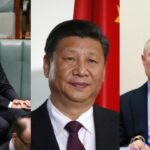The Greens Defence Policy Is About Peace and Independence: Interview with Senator Shoebridge

On 22 March 2025, there occurred frenzied discussions and even denouncements across Australian social media feeds, following news breaking that the Australian Greens had unveiled their first “formally costed policy” regarding Australian defence, which was announced under a headline, outlining that the Greens “plan B” involved investment in drones and missiles.
Greens members tend to be a disappointingly peaceful bunch of people when talk of potential war with China or Yemen or Iran has appeared implied of late by developments initially under the US Biden administration but more so since Donald Trump retook the presidency in January – that is after the noted businessman and reality TV star gave up on portraying himself as a president of peace.
So, it’s no wonder that many Greens members had a visceral reaction towards the headline, along with the multiple commentaries being made about the Greens showing off their South Pacific sub-imperial ambitions and plotting away at investing $4 billion worth of drones and missiles, that some consider will still leave our country dependant on the global supply chain for parts.
This gut reaction that many had is hardly surprising, as over recent years, Australians have found themselves complicit in the most largescale genocide of recent times, that being the ongoing Israeli-perpetrated genocide in Gaza, which is no longer a far off massacre that is out-of-sight and out-of-mind, as rather, the internet has brought the disgusting truth to all our frontal lobes.
An independent and peaceful Australia
The actual Greens media release regarding the defence deal involves decoupling Australia from its heavy dependence on the United States military, to the point that a number of respected Australian figures have warned that US military encroachments in the top end that started in the 1960s and have been escalating since 2011, appear to be something like a soft colonisation.
The $4 billion spend on drones and short- to medium-term missiles are to be locally made and the funds sourced from the $77.5 billion in military funding that our nation will save after dropping AUKUS. Indeed, the AUKUS deal provides no guarantees that promised US and British sourced nuclear-powered submarines for Australia will ever come to fruition.
But even after Greens Senator David Shoebridge, his party’s defence spokesperson, appeared in a videoclip seeking to sought out some of the misconceptions that had bolted on announcement, some supporters of the Greens were continuing to harbour misunderstandings about what the party had put on the table, due to the varied reporting and commentary.
Sydney Criminal Lawyers spoke to Senator David Shoebridge in order to raise some of the questions people have about the Greens defence policy, in order clear up the confusion about what the party has designed as a means to create an independent and peaceful nation, as opposed to its long-term position as US deputy sheriff in the Indo Pacific.
The announcement that the Australian Greens released a defence policy on 22 March sent social media sites into a tither, as it seems that many people did not expect the party to produce a policy that involves weaponry.
Some people have raised one of the Greens’ four pillars, that being peace and nonviolence, as reason why they had not expected a Greens defence policy, while another contention that’s been raised is that you’re a long-term supporter of the peace movement, which might warrant talk of disarmament.
So, David, why has the Australian Greens come to the table with a defence policy in the lead up to the May federal election?
The Greens have always had a defence policy, and it is part of a series of policy commitments that sit under our peace and nonviolence principles.
Our ultimate goal, of course, is a world which has no defence forces, and a world of peaceful coexistence.
We also need a theory of change that addresses the concerns that our members and the broader public have at the moment.
So, our policy is for a radical shift in Australia’s defence force from being part of the US military projecting force against our neighbours and adding to destabilisation in the region, as our vision for the defence force is very different from that.
It is a defence force that is structured to defend Australia – credibly defend Australia – but not threaten our neighbours.
We have also learnt from Australia’s complicity in the genocide in Gaza through US, Israeli and UK weapons platforms that we urgently need to disentangle ourselves from the global arms industry.
If you want to have a defence force that credibly defends Australia and doesn’t threaten our neighbours but disengages us from the global armaments industry, well, you need to have an alternative and that is where the modest investment in defence equipment, and our policy position in relation to that comes from.
The Greens policy is talking decoupling Australia from the USA military-wise, as well as cutting defence expenditure from a currently foreseen $77 billion spend to a $4 billon outlay. These two points alone are enticing.
Can you give us a brief rundown of what else the Greens defence policy entails, and why the measures involved are needed?
The announcement that we made a few weeks ago was part of the suite of measures we have in relation to Foreign Affairs and Defence, and it includes cancelling AUKUS, which saves us $75 billion in the first decade primarily through otherwise incredibly wasteful and reckless expenditure on the nuclear submarine project, as well as cancelling two other weapons platforms.
These comprise of an M1 Abrams tank, which we simply don’t have a defence need for, as well as a 50-year-old US helicopter design, both of which were designed just to enmesh us inside the US military as part of the interoperability mantra from Labor and the Coalition.
With cancelling AUKUS and those two weapons platforms, we would see a $77.5 billion savings in the defence budget, of which we would reinvest $4 billion over the first four years, in defensive equipment manufactured in Australia that helps disentangle us from US, Israeli, UK and French weapons supply chains.
That’s part of our longer-term thinking to not only disentangle us from AUKUS, so we are not part of the next United States war, whether that is against China or some other country.
But this is also part of what we would hope would be a domino effect in the region, where our neighbours also begin to structure their defence forces around the defensive rather than offensive military equipment leading to a regional de-escalation in the arms race.
So, that is $77.5 billion saved over a decade and $4 billion invested into the defensive arms over a four year period?
Correct, $77.5 billion over a decade. The reason the AUKUS figures are for over a decade is that Defence refuses to release in any detail other funding measures for AUKUS because apparently it is too secret.
The Greens defence policy involves a $4 billion spent on defensive drones and short- to mid-range missiles. This is what has raised eyebrows.
There is some confusion as well about whether the Greens proposal to make these weapons in Australia involves them being made here in entirety or whether they’ll still be dependent on the global supply chain, with weapon’s parts being needed from overseas, in the same way that Australia makes and supplies parts of the F-35 jets that bomb Gaza.
So, is that the case?
The whole intention of this policy is to disentangle us from those global supply chains. that we don’t want Australian industry to be part of, which is the whole plan that Labor and the Coalition have under AUKUS, the US and the UK weapons supply chains.
This is about having Australian control over Australian owned and Australian controlled enterprise to produce defensive equipment for the use of the Australian defence force.
It also comes with a clear and longstanding commitment from Australia to prohibit defence exports.
This is literally about learning the lessons that we have seen in the horrors of Gaza and our complicity in that through the F-35 weapons platforms, the export of EOS’ R400 cannons to Israel, and it is learning from those lessons and disentangling us from that toxic local market.
So, there is no exporting of the proposed Australian-made defensive weaponry under the Greens defence policy?
Our Greens’ policy prohibits defence exports. We don’t want to be driving conflict around the planet, and that is at the core of restructuring our defence force, so it is seen by our neighbours, seen by the region, to not be projecting lethal force against them but presenting a prickly echidna when it comes to defence.
Both of those things would encourage our neighbours to deescalate their military defences and hopefully, restructure their defence forces to be focused on defence, to remove defensive capabilities and be a major force for peace in the region.
To ask perhaps an obvious question, especially since Trump took office, why should this nation end its strong military partnership with the USA? How far are the Greens proposing to go with this? Would it affect long-term arrangements like Pine Gap?
Greens policy is incredibly clear in this regard. We are committed to ending AUKUS, to cancelling the radical and dangerous proposal to spend $375 billion on nuclear submarines and enmeshing ourselves in the US and UK arms industry to do that.
To give some sense of how much $375 billion is, that is the equivalent of a million dollars a day every day for a thousand years and then some.
We wouldn’t just cancel AUKUS. Greens policy also calls for the closing of foreign military bases in Australia, that means Pine Gap and Harold Holt and the stationing of nuclear capable B-52 bombers at Tindall airbase.
It would also involve other significant savings in the defence budget, such as cancelling Labor’s current plans to spend $1.6 billion of Australian taxpayers’ money on building a US nuclear submarine attack base on Garden Island off Fremantle.
Those defence policies sit within Greens broader policy commitments to deal with what we say is the most pressing national security risk, which is climate change.
This poses a risk to Australia’s security, in terms of destabilisation in neighbouring countries, potentially large-scale unplanned migration flows and competition over water and food and the resource insecurity that comes from climate change.
The savings that we can get from the defence budget, a significant part of it, should be reinvested in addressing climate change and climate resilience in our neighbours and addressing our real long-term security threats.
We think of that as human-centred security, rather than defence and military-centred security.
Lastly, David, the election outcome is hard to predict right now, and Albanese has repeatedly confirmed he wouldn’t be interested in forming a coalition government with the Greens.
However, all and sundry are singing the praises of the prospect of a Labor-minority government with a broad crossbench holding balance of power.
So, how will the Greens defence policy make a difference under a minority Labor government with broader representation of the Greens than ever before?
Without the Greens there would not be a single national political party committed to ending AUKUS. To stopping the incredibly reckless and dangerous expenditure of $375 billion on nuclear powered submarines.
Without the Greens in parliament, there would be no political party committed to disentangling us from the US military, and saying loudly and clearly, which is what I hear from people of all walks of life, that we don’t want to be involved in Donald Trump’s next reckless war. We don’t want to be part of the next dangerous US invasion.
We have learnt the lessons, we would hope, from Vietnam, Iraq and Afghanistan. We want Australia to be an independent force for a peaceful world, not just a bit player in whatever war the US military next chooses.
The real opportunity that we have, is being part of a progressive crossbench in a minority Labor government.
We will have significant political powers, not just in the Senate, which is often used to delay and block, but also in the House of Representatives and that will allow for a nongovernment majority, which we would hope drives a distinct agenda, hopefully an antiwar agenda, one that really tests AUKUS and ultimately, moves the minority Australian government to cancel AUKUS and reconsider Australia’s ties to Washington.







